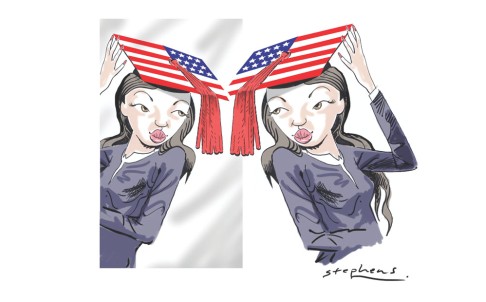Can the great American universities take root in Asia?
Bits and Pieces 2013-08-04
Summary:
- Cross-posting here a column published August 5 in the South China Morning Post (Hong Kong).

Can the great American universities take root in Asia?
The news that Chicago Booth Business School's executive MBA programme would relocate from Singapore was greeted in Hong Kong with as much enthusiasm as the acquisition of a star athlete. Education Secretary Eddie Ng Hak-kim trumpeted that the move would "enhance Hong Kong's position as a regional education hub, nurture talent to support the growth of our economy, and strengthen Hong Kong's competitiveness".
He could have been Hong Kong's cricket coach welcoming Mark Chapman from New Zealand only a week earlier: "We have a very good opportunity of playing in a World Cup for the first time and with the line-up we have, I think we can do it."
But the ongoing changes in higher education are more like biological evolution than a cricket match. Extinction too is part of evolution—and several other American outposts in Singapore, including New York University's Tisch School of the Arts and the hotel school of University of Nevada, Las Vegas (UNLV), are pulling out of the city state with uncertain future plans.
Asia is trying to shortcut a process that took centuries to create the great American universities. And American universities seem to think that an intellectual Bering land bridge has opened. Suddenly they see huge areas with no natural competitors, a promising ecosystem for invasive species.
For a university ... giving up the right to political expression means giving up the pursuit of the truth
This is vanity on both sides, I expect. I wonder how we will think about today's higher education innovations a few decades from now. Perhaps some of the new institutions will prove to be failed experiments, mutations that proved not to fit the environmental niche. The Singapore government was unwilling to keep subsidising UNLV, for example, and a joint Singaporean venture with New York University School of Law is closing after spending down its sizeable government subsidy.
All is guesswork and experimentation. Will any of these American transplants survive for even a decade? And if they survive for the century, will they and their venerable American cousins have become strangers to each other, like the snapping shrimp that no longer recognise each other as relatives because the rising Isthmus of Panama separated them into Caribbean and Pacific species?
If it's too expensive for universities to do business in Singapore - and the strength of the Singapore dollar is part of the story - how will they do in Hong Kong? That may depend on the willingness of Hong Kong to continue the kinds of subsidies that drew the Chicago Business School. Hong Kong is charging Chicago a mere HK$1,000 for a 10-year lease on old officers' quarters on Hong Kong Island. I hope Hong Kong's own universities, themselves products of a continuing evolutionary process, are treated equally well. The University of Chicago is surely grateful to the people of Hong Kong for making its very profitable business programme even more lucrative.
There is a risk that Hong Kong, like Singapore, will find these subsidies unsustainable. Perhaps the government should wait a few years before celebrating its triumph. As a Singaporean official said: "If a branded school is unable to persuade its students to pay their market fees, then it suggests that the brand may not be so attractive after all."
The cream of the crop of academic exotics in Asia is the Yale-National University of Singapore campus, set to open soon. Will the environment be rich enough - in Singaporean and American funds, and Asian students - to keep it alive? So far, none of the closures seems to be related to issues that deeply concern the Yale faculty: how to teach in the spirit of open inquiry in a place where one can be jailed for criticising the government (or for homosexuality, or a variety of other things unconstrained in American universities).
At some point, American universities venturing into authoritarian states will have to square their ambitions with the values of their host countries. NYU president John Sexton's statement about his university's Shanghai campus won't wash forever: "I have no trouble distinguishing between rights of academic freedom and rights of pol
Link:
http://harry-lewis.blogspot.com/2013/08/can-great-american-universities-take.htmlUpdated:
08/04/2013, 21:28From feeds:
Fair Use Tracker » Current Berkman People and ProjectsBerkman Center Community - Test » Bits and Pieces